- Home
- Paul Finch
Dark North (Malory's Knights of Albion)
Dark North (Malory's Knights of Albion) Read online
MALORY’S KNIGHTS OF ALBION
DARK NORTH
PAUL FINCH
Abaddon Books
Dedicated to my children, Eleanor and Harry,
who were my very first audience.
An Abaddon BooksTM Publication
www.abaddonbooks.com
[email protected]
First published in 2012 by Abaddon BooksTM, Rebellion Publishing Limited, Riverside House, Osney Mead, Oxford, OX2 0ES, UK.
Editor-in-Chief: Jonathan Oliver
Desk Editor: David Moore
Cover art: Luke Preece
Design: Simon Parr & Luke Preece
Creative Director and CEO: Jason Kingsley
Chief Technical Officer: Chris Kingsley
Malory’s Knights of Albion created by
David Moore and Jason Kingsley
Copyright © 2012 Rebellion. All rights reserved.
Abaddon Books and Abaddon Books logo are trademarks owned or used exclusively by Rebellion Intellectual Property Limited. The trademarks have been registered or protection sought in all member states of the European Union and other countries around the world. All right reserved.
ISBN (epub): 978-1-84997-339-7
ISBN (mobi): 978-1-84997-340-3
No part of this publication may be reproduced, stored in a retrieval system, or transmitted in any form or by any means, electronic, mechanical, photocopying, recording or otherwise, without the prior permission of the publishers.
This is a work of fiction. All the characters and events portrayed in this book, including in the Introduction and Appendices, are fictional, and any resemblance to real people or incidents is purely coincidental.
Introduction
FOUND IN A church vestry in 2006, the Salisbury Manuscript (British Library MS Add. 1138) is the only existing copy of The Second Book of King Arthur and His Noble Knights. Apparently a sequel to Thomas Malory’s Le Morte D’Arthur, the best-known and most influential version of the story of King Arthur and his Round Table, the Second Book has caused enormous controversy throughout the academic world.
Following negotiations with the manuscript’s owner, Abaddon Books won the rights to modernise and publish the stories for the mainstream market in early 2010. Dark North is the third title to be released to the public.
For more information about the Salisbury Manuscript, and themes and notes from this story, see the Appendices at the rear of this book.
My son,1
When I am gone you will inherit nothing but my bad name, this fur and this sword. Do not underestimate their power. In particular, do not underestimate this sword, for it is the embodiment of our strength. Wield it, and those who come against you will fall like stalks of grass. Do not think this an evil thing, for you will be lord and protector of many lands. While countless will die by your sword, countless others will live by it.
God rules this world and His people thrive, not because He is good but because He is strong. Christians once died like cattle, men, women and children hunted down and put to death in torturous ways. They only came to safety the day they struck back. At the battle of the Milvian Bridge, General Constantine destroyed the pagan horde of the pig Maxentius with blood and iron. This is the only lesson you need learn. The men of the One God rule because they are mightier than those of many gods. Do not be fooled by the wittering of priests and monks. Strength matters. Spare those who oppose you, and they will kill you and your children. This gift of rage I bequeath to you in the form of this sword, which has delivered death to more foes than I can count, and must continue to.
Worship God, serve your overlord, and vanquish your enemies – vanquish them utterly. There is no law but your own. God respects those who conquer and triumph in His name. Your enemies are His. Cleanse the world of them.
– Duke Corneus of Penharrow,
Dictated on his death-bed
Prologue
LUCIUS JULIO BIZERTA2 did not care a great deal for the Imperial purple. Nor did he stand on ceremony, not even when there were matters of state to discuss. As such, on that unseasonably mild February evening when he received twelve honoured guests in the audience chamber of the Episcopal Palace at Ravenna, he was wearing a simple tunic, breeches and sandals. There were no laurel leaves on his brow; there was no sceptre in his hand; the only ring on his hands was the royal seal.
The chamber was tall and spacious, and built from polished white marble, but aside from its simple New Testament frescoes, and the heavy ermine curtain drawn across its single casement, it was devoid of ornamentation. The hearth was bare – the hot-water pipes under the tiled floor provided adequate warmth, and numerous candelabra cast an orange glow. Twelve cushioned seats were arranged for the guests; as they included two consuls, three senators, several high churchmen, and various representatives of the capital’s wealthiest patrician families, they might have expected greater extravagance, but less was always more where Emperor Lucius was concerned. He didn’t address them flanked by flunkeys, but with only a single scribe to keep a record of their meeting. He awaited their arrival behind a broad teak desk rather than seated on a gilded throne; a desk layered with books and quills, which revealed more than words ever could the enquiring state of his mind and his dedication to personal industry.
The Emperor was not tall – about middle height, but with a strong, stocky frame, and possessed of curly red-gold hair, and a light red-gold beard and moustache. His complexion was unusually ashen for one born in Capua, far to the south, but he was a handsome man with a steady smile, a straight aquiline nose and bright green eyes. From his simple attire, restless air and tireless movement, one might have thought him an artisan, a talented but humble fellow who strove tirelessly for a good greater than his own glory but drew pride and satisfaction from it nevertheless.
“Gentlemen,” he said, once his guests were seated. He walked around his desk and stood in front of it, arms folded. “It always reassures me to summon such august company, and see it arrive with such a dignified lack of haste. Only conspirators hasten to their Emperor’s presence.”
There was a mumble of polite laughter.
“The only conspiracy here, Caesar, is to sing your praises,” Consul Rascalon replied. “Because of you, the world will soon be Roman again.”
Lucius shook his head. “No. Not the world, just the parts of it that were Roman before. Gentlemen... we live in a bustling age. Powers rise and fall, some of them righteous, some of them vile. There has been much chaos, much bloodshed. But there have also been achievements – in the arts and sciences, in culture and philosophy. One cannot, and indeed must never, belittle the successes of those who were left to gather up the pieces when the Empire collapsed.”
“Those who kept the candle of civilisation burning during those dark years are to be honoured,” Consul Rascalon said. “But alas, these became small voices in a wilderness of barbarism, much of it heathen. It is you who have brought the light back to the Empire, Caesar. Glory to your name!”
Cheering filled the audience chamber. Fists stabbed the air.
Lucius acknowledged this with a patient smile, but gestured for peace.
“This isn’t about conquest for its own sake, gentlemen. Or even reconquest. I’m sure you’ll agree I have gone out of my way not to tyrannise. Things must never be allowed to revert to the way they were in the bad old days... of Gaius Caligula’s reign, for example, when the Emperor made whores of his best friends’ wives simply because he could. Or the days of Nero, when fear and superstition led the Palatine gardens to be lit by Christians smeared with pitch and made into living torches.”
The guests fell silent in mute recognition of these tragic e
vents. The bishops among them nodded their skull-capped heads sagely.
“What I wish to restore to our provinces is the light of learning and love,” Lucius added. “Rome as a parent, a firm father and caring mother, a guiding hand for those who, since our departure, have come to wallow in ignorance and squalor.”
“No-one has ever doubted this, Caesar,” Rascalon stated.
“This is why we have christened our resurgent empire ‘New Rome.’ We are proud of our past, but there are many reasons why we also need to break from it.”
His audience listened intently.
“So let us consider what New Rome has so far accomplished.” Lucius clapped his hands and two attendants entered carrying a display board, which they set up alongside their master’s desk. A map of the Empire was pinned to it; the eastern provinces were marked in gold, the western ones in red.
Bishop Severin Malconi, in whose own palace they sat, regarded the map warily. He was a plump, sunburned man of fifty years, whose close-cropped white hair belied his youthful looks. As a boy, he would never have dreamed to see Roman hegemony restored to so many disorderly regions. The notion that the Mediterranean Sea could ever again be a ‘Roman lake’ would have amazed and enthused him, and yet how quickly these staggering events had come to pass.
Lucius continued: “We have now recovered in full the provinces of Italy, Africa, Spain, Gaul and Aquitaine. In some cases they are still controlled by their original potentates, but now they pay fealty and taxes to us.”
Malconi glanced sidelong at his young nephew, Felix Rufio, who was present both as a patrician and as a tribune in the army. Rufio was handsome and dark-eyed, his short hair so black it was almost blue. Unlike many of his age, he was clean-shaven. As he was fond of saying when in his cups: “Why hide looks like mine beneath a baggage of unsightly, perfumed bristles?”
The Emperor was still addressing the business at hand. “Of course, things are never straightforward. Those provincial rulers who had lapsed into pagan traditions have been advised to... reconsider their ways. Religious missions have been sent, and churches and monasteries restored.”
Proclates, the Bishop of Palermo, spoke up. “Time is an issue here, Caesar. Dangerous beliefs have taken root. Might I enquire at what stage we can expect to see more persuasive methods used? In those corners of Empire which have strayed far from the light?”
Bishop Proclates was an athletic, blond-haired hawk of a man. He might affect the trappings of religion on state occasions, but he was young and virile, and known to be as fond of the feast and the hunt as he was the cloister or the chapel. He was also known for his vaunting ambition. Malconi smirked. There had been much talk recently that valuable archbishoprics would be up for grabs in the re-acquired provinces – if only the local leaders the Emperor spoke of could be persuaded to tolerate them.
“I’ve discussed the matter with His Holiness,” Lucius replied, “and we’ve decided that at this early stage there is no need to be too provocative. Particularly in those cases where renewed loyalty has been bought rather than enforced. To use a plebeian phrase, we see no need to upset the applecart just yet.”
Proclates looked disgruntled, but said no more.
“Religious issues aside,” the Emperor continued, “not everything is rosy in New Rome’s garden. You’ll notice that the one glaring omission from this list of recaptured territories is Britain.”
Rufio clutched Bishop Malconi’s arm. The young tribune stared excitedly at the map, and at the boot-shaped island in the corner. Malconi sighed. The follies of youth knew no bounds.
“It is my intention,” the Emperor said, “to send a new embassy to Britain. And I would like you twelve to go as my official representatives.”
Rufio released his uncle’s arm and clenched his fist in triumph.
“A number of you were present on the last embassy I sent to King Arthur’s court, so you know what to expect. I’ve written to Arthur several times since, pressing my claim, but always I get the same intransigent response.”
Quintus Maximion, another tribune in the army, stood. He was a much older man than Rufio, but tall and muscular, with solemn features and iron-grey hair.
“Lord Caesar,” he began, “Arthur’s kingdom is stable and prosperous. I can think of no reason why he would see benefit in becoming a client-king of the Roman Empire.”
Lucius laughed. “That’s the reason why I’ve assembled twelve of the brightest minds in Rome. Together, I’m sure you can enlighten him.”
“Forgive me, Caesar,” Maximion said, “but I was part of that embassy, six years ago. The country was in a more fragile state in those days. There were many recalcitrant elements that Arthur had to deal with. But even then he saw no advantage in bowing to Roman rule. Why would he see things differently now?”
Rufio also stood. “Tribune Maximion has a very defeatist attitude. I was there also, and I detected divisions among Arthur’s nobility. I did not see him as the invulnerable sovereign his propagandists claim.”
“Gentlemen, please!” Bishop Malconi said, standing. “May I...?”
He gestured gently at the two soldiers, and reluctantly they sat.
“We all know Arthur to be a strong and confident ruler,” Malconi said. “We also know that he has the full support of his people, magnates and peasants alike. He is to be respected, certainly... but let us not get carried away. By no stretch of imagination can we put him on the same pedestal as our own revered ruler.”
There was hearty agreement, and Tribune Maximion shook his head firmly, as if to dispel the very possibility.
“Well spoken, my lord bishop,” Lucius said. “Please continue.”
Malconi wove his fingers together, a pose he used in the Senate when he felt he was on secure ground. “The main difference, as I see it, between this embassy and the last is that, increasingly, we have right on our side. And the whole of Christendom will recognise...”
Maximion stood up again. “Forgive me, your grace, but how can it be right to steal another man’s freedom?”
There was a disbelieving silence. Malconi looked around at his opponent as if he couldn’t quite believe that anything so blasphemous had been uttered in the presence of a Roman Emperor. Maximion flushed a little, perhaps realising that he’d gone too far. He turned to his master, although it was difficult meeting the Emperor’s cool, green-eyed gaze.
“Tribune Maximion, your opinions are welcome,” Lucius said. “That is why I summoned you here. But I think you misunderstand our purpose. We are not denying anyone their freedom; we are merely seeking to bring order to the world. Bishop Malconi is quite correct. With the rest of the Western Empire settled, and only one unruly state remaining, it could even be said that we now have a moral obligation to intervene in British affairs...”
“And I say again, Caesar...” Maximion looked troubled by the stand he was making, but he persisted. “When I look at Britain, I see no unruly state. In our absence, Camelot has become the cultural heart of northern Europe. The people are content to work and play under a ruler who does not oppress them. Surely this is something we should encourage, not punish?”
“And what of the devil, Merlin?” Bishop Proclates wondered.
Maximion shrugged. “I’ve heard that Merlin has left Camelot.”
“You’ve heard, but do you know?” Proclates’s voice was scornful. “And even if Merlin has left, Arthur’s power was built on his druidic magic. The pagan influence is everywhere. You only need wander Britain’s woods and fields to see standing stones, ancient temples...”
“Yes,” Maximion retorted. “In an equal state of disrepair to those in Rome.”
Proclates sneered, but had no immediate riposte.
“It’s good that we’re having this debate,” Lucius interrupted. “This is exactly what I was hoping for when I assembled you.” He turned to Maximion. “But while I think you speak from the heart, tribune, I fear you underestimate what Roman citizenship can bring to a nation. Britain may be a
happy land at present, under its kind king. But I see few roads there, and even fewer cities. I see no system of education for the people of the country, no organised civil service. Much of the land is still covered by wild forest. Britain could be so much more than it is today. Surely you don’t dispute that?”
“No, my lord, I don’t. But if they don’t want it...”
“When you say they, who do you mean, tribune? They as in Arthur and his court, who enjoy all the liberties and luxuries of any nobility? Or they as in the people on whose backs that nobility rides?”
Maximion sat down, knowing when he was beaten.
Malconi broke the brief silence that followed. “Tribune Maximion’s concerns are understandable, Caesar. Those who matter in Britain will not wish to be made servants in their own land, no matter how cleverly we argue at the negotiating table. They will resist us.”
Lucius nodded sadly, as if reluctant to accept.
“They may also, my lord,” Malconi added, “appeal to the Vatican. Arthur is a Christian monarch. His knights were famous for their battles against heathen powers.”
Again Lucius nodded. “All of this is acknowledged by the Holy Father. For which reason he will always seek, in public at least, to steer a middle course. But at heart he shares our worries for the common good of the British people, and in addition has concerns of his own. He feels that Christian teaching in Britain is in need of reform. It may even be straying into the realms of heresy – not purposely, but through a lack of communication.3 Britain is on the fringes of our known world. Like fruit at the end of a tenuous vine, it is withering. Pope Simplicius sees it as our duty to nourish this fruit. And to do that, we must first enclose it in our own vineyard.”

 Stolen
Stolen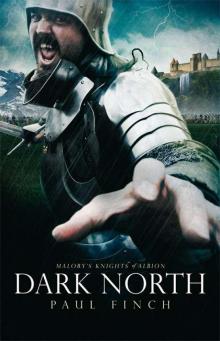 Dark North mkoa-3
Dark North mkoa-3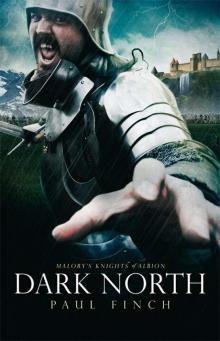 Dark North (Malory's Knights of Albion)
Dark North (Malory's Knights of Albion) a collection of horror short stories
a collection of horror short stories Sacrifice
Sacrifice Kiss of Death
Kiss of Death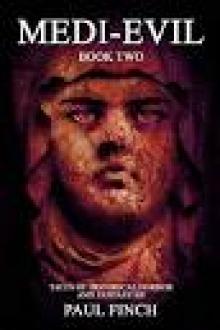 Medi-Evil 2
Medi-Evil 2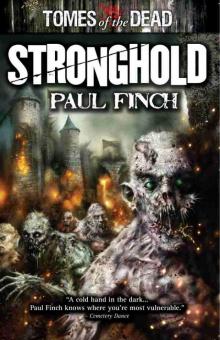 Stronghold
Stronghold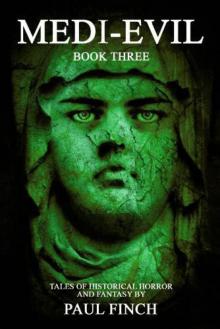 Medi-Evil 3
Medi-Evil 3 Dead Man Walking
Dead Man Walking Strangers
Strangers The Killing Club
The Killing Club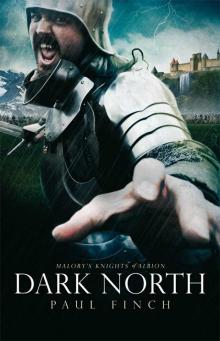 Dark North
Dark North A Wanted Man
A Wanted Man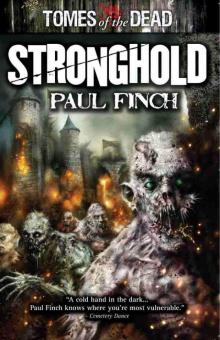 Stronghold (tomes of the dead)
Stronghold (tomes of the dead) Hunted
Hunted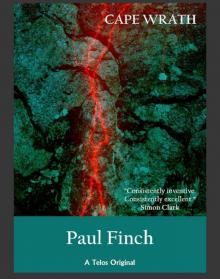 Cape Wrath
Cape Wrath Stalkers
Stalkers The Burning Man
The Burning Man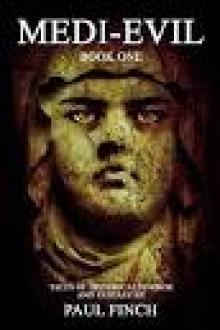 Medi-Evil 1
Medi-Evil 1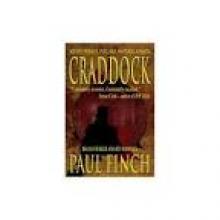 Craddock
Craddock Hunted (Detective Mark Heckenburg Book 5)
Hunted (Detective Mark Heckenburg Book 5)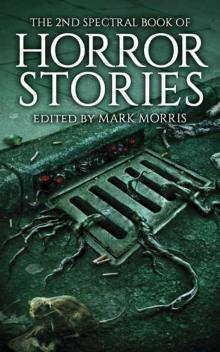 2nd Spectral Book of Horror Stories
2nd Spectral Book of Horror Stories The Chase
The Chase